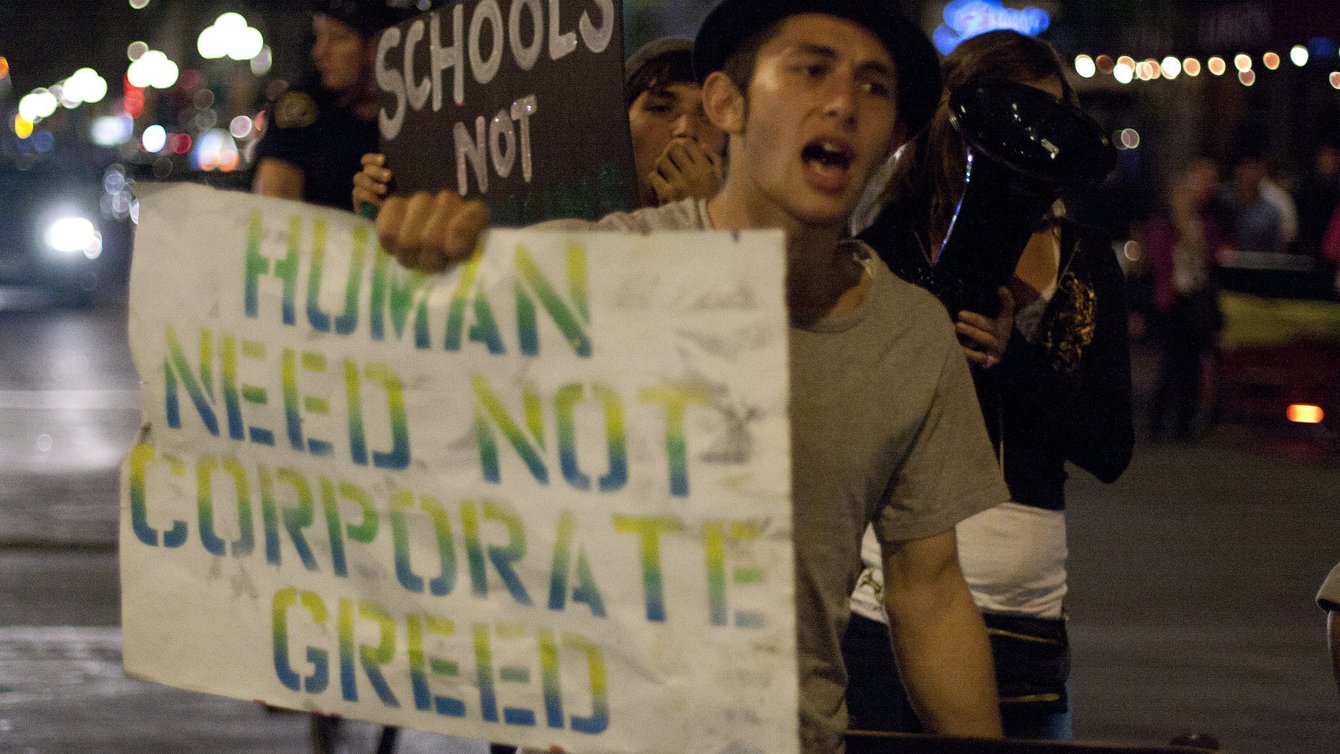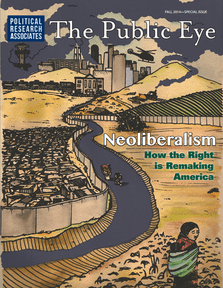In 2011, Host Hotels & Resorts, Inc., a corporate partner of the Marriott hotel chain, used a general contractor that it had hired to renovate guest rooms at the Host-owned Copley Marriott in Boston. A convoluted web of subcontractors emerged, as the general contractor subcontracted the work to several other companies, and some of that subcontracted work was then further subcontracted, with more than a dozen firms working on the same project.
A state-led, multi-agency investigation found that 15 contractors on the project committed a wide array of labor law violations. Workers from a church-sponsored rehabilitation project in Philadelphia were paid only four dollars an hour—just half the state minimum wage—and no overtime, though they were required to work 12-hour days and more than 60 hours per week. All told, contractors failed to report or pay taxes on more than $1 million in wages, and at least one of them failed to maintain workers’ compensation insurance policies for the hazardous work. They misclassified many of the workers as independent contractors, thus evading tens of thousands of dollars more in unemployment insurance taxes, workers compensation premiums, and employer-side taxes, while stripping workers of basic workplace rights.1
Because so many layers of contractors were involved in the project, investigators had difficulty determining which ones could be held responsible for the violations. Host Hotels, which ultimately benefited from the sub-minimum wages and tax evasion, asserted that it had no legal obligation to the workers and should not be held liable for any of the violations committed by the subcontractors or their subcontractors.2
Companies at every possible level of the project avoided accountability for the mistreatment of the workers. Despite having found that 15 companies had broken the law and abused their workers, authorities only held three subcontractors to the most immediate sanction—Stop Work Orders. The general contractor neither faced significant penalties nor admitted wrongdoing. As a summary of the investigation put it, “The issue of which entity was legally the employer and responsible for the wages was never resolved.”3
An Old Neoliberal Paradigm
We increasingly see businesses like the Marriott (and corporate partner Host Hotels) seeking to shed the burden of government regulation by passing off liability to intermediaries, like staffing agencies, or by falsely claiming that no labor laws at all apply because the workers are either independent contractors or corporations in business for themselves. By restructuring work relationships in these ways, some of the nation’s largest corporations aim to shift much of their workforce outside the scope of employment laws and employment taxes that apply to “employees”—as defined by a set of labor laws that still presume a conventional workplace with one employer and the on-site workers it directly hires.
“This shift in work structures, combined with increased attacks on the labor movement and the de-funding of the nation’s labor enforcement agencies, has depressed workers’ income and weakened their ability to claim basic workplace rights like overtime pay and health and safety protections.”
This shift in work structures, combined with increased attacks on the labor movement and the de-funding of the nation’s labor enforcement agencies, has depressed workers’ income and weakened their ability to claim basic workplace rights like overtime pay and health and safety protections. Outsourcing and independent contractor misclassification have also drained millions from local, state, and federal coffers, undermining the social safety net just as workers need its protection even more. The isolation from fellow workers that the “independent contractor” designation engenders cuts against workers’ ability to organize to challenge abuses resulting from subcontracted work structures.
Reorganization of work structures also acts to direct workers’ anger away from the company calling the shots (such as a general contractor) and onto the direct employer, or even to the workers themselves, who may believe their situation stems from their own failings as independent business people. All of these factors undermine workers’ ability to organize into unions and worker collectives, one of the fundamental goals of The economic, social, and political position that centers individual freedom, undergirded by a weak government and unfettered, free-market capitalism. Learn more and its pursuit of an unregulated free market.
Free Markets, Unfree Workers
The rise to power of Ronald Reagan in the United States and Margaret Thatcher in the United Kingdom ushered in a new era of economic policy. Minimal corporate taxation, privatization of public goods, and the deregulation of businesses became the dominant policies promoted for economic growth. The attacks against organized labor, progressive organizations, and community groups that opposed the new regime were brutal. The percentage of workers in unions plummeted.
Across the country, new formations emerged that tried to deal with this onslaught of attacks on workers. Coalitions of organized labor, grassroots organizations, and worker centers began fighting back together and winning campaigns using a combination of militant rank-and-file membership, intelligent planning, and strategic organizing. The target of these campaigns was often a clearly identifiable owner of the business, and so workers and community allies knew whom to hold responsible for the conditions of work. This, however, is no longer the case, as seen in the Copley Mariott and other examples where companies pass on liability to their subcontractors and outsourced agencies, making it difficult for workers to hold real employers accountable.
Such interruption in the employer-employee relationship is reminiscent of the neoliberal structural adjustment policies the World Bank and International Monetary Fund have imposed on so-called developing countries. As the IMF and World Bank required national governments to loosen labor laws and other regulations to promote free trade and supposed foreign investment, corporations have similarly restructured the relationship between employer and employee to avoid government regulation altogether and to create confusion over who is responsible for workers. Ultimately, the result is the same: structural adjustment and debt repayment policies increased poverty and stripped local governments’ ability to provide basic health care, education, and employment for their citizens, while the restructuring of employer/employee relationships has helped create a shadow (or underground) economy free from regulation and has reduced the government’s ability to provide an adequate safety net for the growing low-wage, contingent workforce.
In Massachusetts, the Joint Task Force on the Underground Economy and Employee Misclassification has collected more than $55 million in the past five years from individuals and businesses that engage in strategies to avoid responsibility to their workers.4 The Task Force utilizes existing labor laws and regulations to recover nonpayment of wages and payroll taxes; licenses and permit fees; unemployment and workman’s compensation insurance, and other important monies owed to workers and the state. Despite its successes, the Task Force is limited by existing labor law and is unable to broaden its scope of accountability to include companies who surely profit from workers, but may not be legally defined as their direct employer.
“Extensive use of abusive subcontracting and misclassification schemes and other outsourcing tools are eroding the 80 years of labor protections that many have come to take for granted.”
Toward A New Legal Framework
Extensive use of abusive subcontracting and misclassification schemes and other outsourcing tools are eroding the 80 years of labor protections that many have come to take for granted. Community Labor United and the Immigrant Worker Center Collaborative are working to close that accountability gap in Massachusetts with a new legal framework, being developed by the National Employment Law Project, that holds all entities in the labor supply chain responsible—whether they initiate the demand for the work, orchestrate a project, or directly hire and supervise the workers. We call this the “accountable employer” framework.
Accountable employers know what work is being performed, often control the conditions under which it is performed, and have the power to ensure compliance with labor laws and regulations. All entities and creators of supply chain or outsourced work arrangements would then be held liable for performing these key employer functions.
In the Copley Marriott case, the Accountable Employer framework would hold multiple parties responsible because of the labor violations they perpetrated. The Philadelphia church that supplied $4-an-hour workers would be accountable for creating and ending the employment relationship; the general contractor and its subcontractor would be accountable for managing the enterprise internally and externally; and Host Hotels would be accountable because it received the fruits of the workers’ labor.
Similarly, a new Accountable Employer statute would make a large corporate employer like Wal-Mart responsible for wages and working conditions in its supply chain even if it outsources much of the labor (and even management). Wal-Mart controls the timing and manner of delivery of the goods on its store shelves, decides how goods are handled when they are unloaded and delivered, and uses its market dominance to force contractors to keep costs as low as possible. Wal-Mart engenders labor violations in its supply chain and therefore should be on the hook for these abuses.
As corporations continue to look for ways to skirt government regulations and increase their profit margins, many will continue to hire intermediaries or misclassify workers as a way of outsourcing their responsibility and escaping liability. This shift is part of neoliberalism’s broader political realignment towards deregulation of markets and the empowerment of corporations. However, employer accountability can be restored through legislation that holds all entities throughout the web of contractors and subcontractors responsible for their workers.
- Endnotes
- Massachusetts Joint Enforcement Task Force on the Underground Economy and Employee Misclassification (JTF), 2013. “2012 Annual Report,” p. 6. [http://www.mass.gov/lwd/eolwd/jtf/annual-report-2012.pdf]
- Casey Ross, “Marriott Copley Place project flouted pay law.” Boston Globe, 4 September 2012. [http://www.bostonglobe.com/business/2012/09/03/investigators-find-widespread-labor-violations-copley-marriott-renovation/iIRlNeRovG05Dkbta3rOTI/story.html]
- Massachusetts Joint Enforcement Task Force on the Underground Economy and Employee Misclassification (JTF), 2013. “2012 Annual Report,” p. 6. [http://www.mass.gov/lwd/eolwd/jtf/annual-report-2012.pdf]
- Massachusetts Joint Enforcement Task Force on the Underground Economy and Employee Misclassification (JTF), 2014. “2013 Annual Report,” [http://www.mass.gov/lwd/eolwd/jtf/annual-report-2013.pdf]

